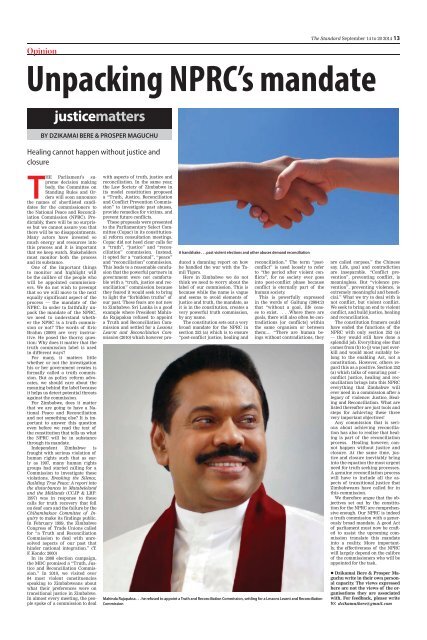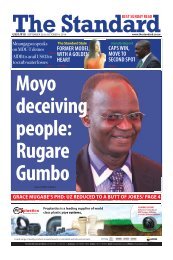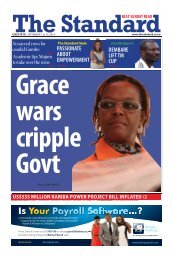Create successful ePaper yourself
Turn your PDF publications into a flip-book with our unique Google optimized e-Paper software.
Opinion<br />
<strong>The</strong> <strong>Standard</strong> September 14 to 20 2014 13<br />
Unpacking NPRC’s mandate<br />
justicematters<br />
BY DZIKAMAI BERE & PROSPER MAGUCHU<br />
Healing cannot happen without justice and<br />
closure<br />
<strong>The</strong> Parliament’s supreme<br />
decision making<br />
body, the Committee on<br />
Standing Rules and Orders<br />
will soon announce<br />
the names of shortlisted candidates<br />
for the commissioners to<br />
the National Peace and Reconciliation<br />
Commission (NPRC). Predictably,<br />
there will be no surprises<br />
but we cannot assure you that<br />
there will be no disappointments.<br />
Many actors have invested so<br />
much energy and resources into<br />
this process and it is important<br />
that we keep watch. Stakeholders<br />
must monitor both the process<br />
and its substance.<br />
One of the important things<br />
to monitor and highlight will<br />
be the calibre of the people who<br />
will be appointed commissioners.<br />
We do not wish to preempt<br />
that so we will move to the next<br />
equally significant aspect of the<br />
process — the mandate of the<br />
NPRC. In order to faithfully unpack<br />
the mandate of the NPRC,<br />
we need to understand whether<br />
the NPRC is a truth commission<br />
or not? <strong>The</strong> words of eric<br />
Brahm (2009) are very instructive.<br />
he posed the thorny question:<br />
Why does it matter that the<br />
truth commission label is used<br />
in different ways?<br />
For many, it matters little<br />
whether or not the investigation<br />
his or her government creates is<br />
formally called a truth commission.<br />
But as policy reform advocates,<br />
we should care about the<br />
meaning behind the label because<br />
it helps us detect potential threats<br />
against the commission.<br />
For Zimbabwe, does it matter<br />
that we are going to have a National<br />
Peace and Reconciliation<br />
and not something else? It is important<br />
to answer this question<br />
even before we read the text of<br />
the constitution that tells us what<br />
the NPRC will be in substance<br />
through its mandate.<br />
Independent Zimbabwe is<br />
fraught with serious violation of<br />
human rights such that as early<br />
as 1997, many human rights<br />
groups had started calling for a<br />
Commission to investigate these<br />
violations. Breaking the Silence,<br />
Building True Peace: A report into<br />
the disturbances in Matabeleland<br />
and the Midlands (CCJP & LRF:<br />
1997) was in response to these<br />
calls for truth recovery that fell<br />
on deaf ears and the failure by the<br />
Chihambakwe Committee of Inquiry<br />
to make its findings public.<br />
In February 1999, the Zimbabwe<br />
Congress of Trade Unions called<br />
for “a Truth and Reconciliation<br />
Commission to deal with unresolved<br />
aspects of our past that<br />
hinder national integration.” (T.<br />
F. Kondo: 2000)<br />
In its 2008 election campaign,<br />
the MDC promised a “Truth, Justice<br />
and Reconciliation Commission.”<br />
In 2010, we visited over<br />
84 most violent constituencies<br />
speaking to Zimbabweans about<br />
what their preferences were on<br />
transitional justice in Zimbabwe.<br />
In almost every meeting, the people<br />
spoke of a commission to deal<br />
A handshake . . . past violent elections and other abuses demand reconciliation<br />
with aspects of truth, justice and<br />
reconciliation. In the same year,<br />
the Law Society of Zimbabwe in<br />
its model constitution proposed<br />
a “Truth, Justice, Reconciliation<br />
and Conflict Prevention Commission”<br />
to investigate past abuses,<br />
provide remedies for victims, and<br />
prevent future conflicts.<br />
<strong>The</strong>se proposals were presented<br />
to the Parliamentary Select Committee<br />
(Copac) in its constitutional<br />
reform consultation meetings.<br />
Copac did not heed clear calls for<br />
a “truth”, “justice” and “reconciliation”<br />
commission. Instead,<br />
it opted for a “national”, “peace”<br />
and “reconciliation” commission.<br />
This leads to a reasonable conclusion<br />
that the powerful partners in<br />
government were not comfortable<br />
with a “truth, justice and reconciliation”<br />
commission because<br />
they feared it would seek to bring<br />
to light the “forbidden truths” of<br />
our past. <strong>The</strong>se fears are not new<br />
to Zimbabwe. Sri Lanka is a good<br />
example where President Mahinda<br />
Rajapaksa refused to appoint<br />
a Truth and Reconciliation Commission<br />
and settled for a Lessons<br />
Learnt and Reconciliation Commission<br />
(2010) which however produced<br />
a damning report on how<br />
he handled the war with the Tamil<br />
Tigers.<br />
here in Zimbabwe we do not<br />
think we need to worry about the<br />
label of our commission. This is<br />
because while the name is vague<br />
and seems to avoid elements of<br />
justice and truth, the mandate, as<br />
it is in the constitution, creates a<br />
very powerful truth commission,<br />
by any name.<br />
<strong>The</strong> constitution sets out a very<br />
broad mandate for the NPRC in<br />
section 252 (a) which is to ensure<br />
“post-conflict justice, healing and<br />
reconciliation.” <strong>The</strong> term “postconflict”<br />
is used loosely to refer<br />
to “the period after violent conflicts”,<br />
for no society ever goes<br />
into post-conflict phase because<br />
conflict is eternally part of the<br />
human society.<br />
This is powerfully expressed<br />
in the words of Galtung (2004:2)<br />
that “without a goal, life ceases<br />
to exist. . . .Where there are<br />
goals, there will also often be contradictions<br />
[or conflicts] within<br />
the same organism or between<br />
them;… “<strong>The</strong>re are human beings<br />
without contradictions, they<br />
Mahinda Rajapaksa . . . he refused to appoint a Truth and Reconciliation Commission, settling for a Lessons Learnt and Reconciliation<br />
Commission<br />
are called corpses,” the Chinese<br />
say. Life, goal and contradiction<br />
are inseparable. “Conflict prevention”,<br />
preventing conflict, is<br />
meaningless. But “violence prevention”,<br />
preventing violence, is<br />
extremely meaningful and beneficial.”<br />
What we try to deal with is<br />
not conflict, but violent conflict.<br />
We seek to bring an end to violent<br />
conflict, and build justice, healing<br />
and reconciliation.<br />
<strong>The</strong> constitution framers could<br />
have ended the functions of the<br />
NPRC with only section 252 (a)<br />
— they would still have done a<br />
splendid job. everything else that<br />
comes from (b) to (j) was just overkill<br />
and would most suitably belong<br />
to the enabling Act, not a<br />
constitution. however, others regard<br />
this as a positive. Section 252<br />
(a) which talks of ensuring post –<br />
conflict justice, healing and reconciliation<br />
brings into this NPRC<br />
everything that Zimbabwe will<br />
ever need in a commission after a<br />
legacy of violence: Justice, healing<br />
and Reconciliation. What are<br />
listed thereafter are just tools and<br />
steps for achieving these three<br />
very important objectives!<br />
Any commission that is serious<br />
about achieving reconciliation<br />
has also to realise that healing<br />
is part of the reconciliation<br />
process. healing however, cannot<br />
happen without justice and<br />
closure. At the same time, justice<br />
and closure inevitably bring<br />
into the equation the most urgent<br />
need for truth seeking processes.<br />
A genuine reconciliation process<br />
will have to include all the aspects<br />
of transitional justice that<br />
Zimbabweans have called for in<br />
this commission.<br />
We therefore argue that the objectives<br />
set out by the constitution<br />
for the NPRC are comprehensive<br />
enough. Our NPRC is indeed<br />
a truth commission with a generously<br />
broad mandate. A good Act<br />
of parliament must now be crafted<br />
to assist the upcoming commission<br />
translate this mandate<br />
into a reality. More importantly,<br />
the effectiveness of the NPRC<br />
will largely depend on the calibre<br />
of the commissioners who will be<br />
appointed for the task.<br />
• Dzikamai Bere & Prosper Maguchu<br />
write in their own personal<br />
capacity. <strong>The</strong> views expressed<br />
here are not the views of the organisations<br />
they are associated<br />
with. For feedback, please write<br />
to: dzikamaibere@gmail.com


















